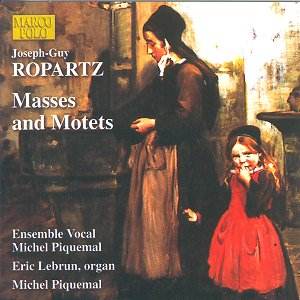Joseph-Guy ROPARTZ
(1864-1955)
Masses and Motets
Missa te deum laudamus in honour of S. Aloisii Gonzagae for STBs and
organ (1926)
Sub tuum praesidium for SA and organ
Five motets for four voices a cappella
Salve Regina for four voices and organ
Hic vir despiciens mundum for TBs and organ
Missa Brevis in honour of Saint Anne for SMTB and organ
(1921)
Ave verum for STBs and organ
Ave Maria for four voices a cappella
Mass in honour of Saint Odile for STBBs and organ
(1923)
 Ensemble Vocal Michel
Piquemal/Michel Piquemal
Ensemble Vocal Michel
Piquemal/Michel Piquemal
Eric Lebrun (organ)
rec Cavaillé-Coll Organ, Saint Antoine des Quinze-Vingts, Paris, Sept
1996. DDD
 MARCO POLO 8.225126
[79.05]
MARCO POLO 8.225126
[79.05]
Crotchet
AmazonUK
AmazonUS

May Marco Polo's partnership with Michel Piquemal long flourish. He has already
stocked our shelves, and our imaginations, with many compelling revivals
from the neglected French musical renaissance. Ropartz is the latest in the
pilgrimage.
Ropartz was born in Guincamp, Côtes du Nord. He began legal studies
out of deference to his parents' wishes as did an extraordinary number of
composers. After study with Dubois, d'Indy and Franck he was appointed director
of the conservatoire, Nancy, then, in 1919, secured the parallel position
at Strasbourg until his retirement to his native Brittany in 1929. He died
in Brittany at the age of 91 with 200 works to his name.
Ropartz's profound belief in Christianity runs through these devotional works
which are mostly supported by Eric Lebrun's tactful organ playing. As settings
they do not have the burning spirit apparent in the Koechlin motets (heard
recently by me on a highly desirable Skarbo disc). Instead they are closer
to Howells' choral music without the 'high hills' ecstasy of the Gloucestershire
composer. Dyson might be a better reference point as might Finzi at the less
assuming level of, say, the Magnificat. The music is lower key, not
intrusive, acting rather as a channel for devotion than an assertive focus
for the attention. It is all superbly sung and Piquemal's sopranos are superior
in technical control to those of Gilbert Martin-Bouyer on the still mandatory
SKARBO (SK2972) Koechlin collection. I would single out the antiphonal
sweetnesses of the Kyrie and Sanctus of the Saint Anne Mass
for sampling. Ropartz and Piquemal avoid theatricality and excess.
As Mathieu Ferey says in his booklet notes "... this music will still speak
to non-believers - of nostalgia, of poetry, and of meditation." Full texts
and translations are most thoughtfully provided by Marco Polo. This company
continues to change and reform the musical landscape in a way that none other
has approached. The playing time is exceedingly generous.
Now that Marco Polo have delighted us with Guridi's opera Amaya can
we hope that they will now sharpen their plans in the direction of Ropartz's
Le Pays, Canteloube's Le Mas, Lazzari's La Lépreuse
and Louis Aubert's Le Train Bleue. Ropartz's symphonies (four
of the five - No. 3 has been well done by Pathé-Marconi-EMI) also
need premiere recordings.
Rob Barnett

